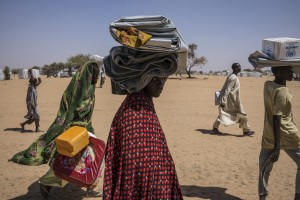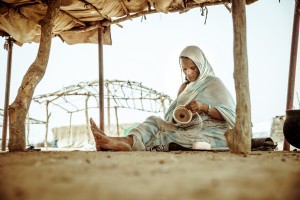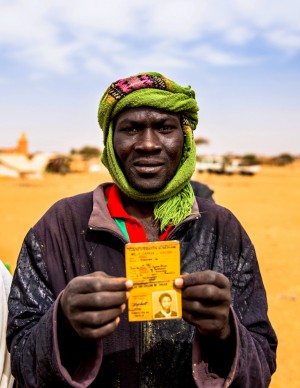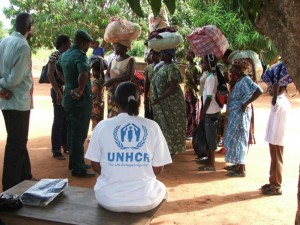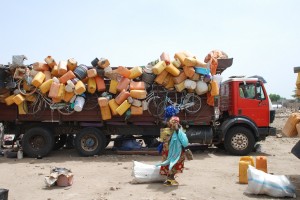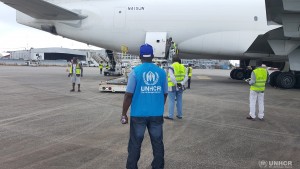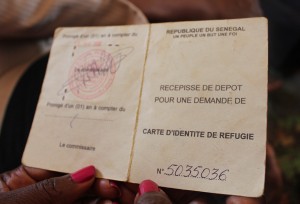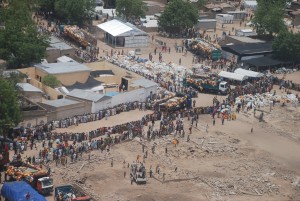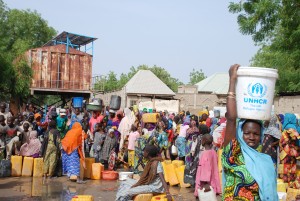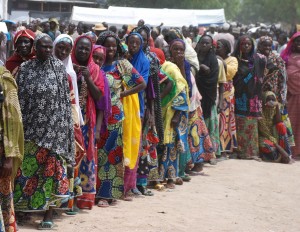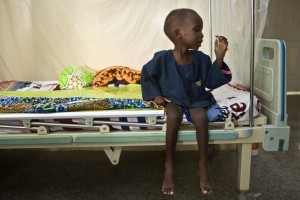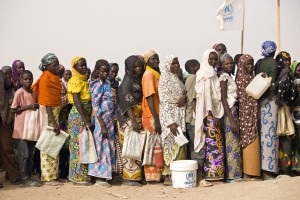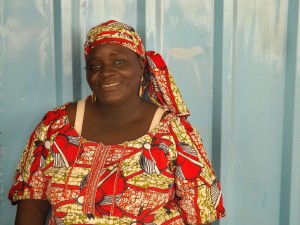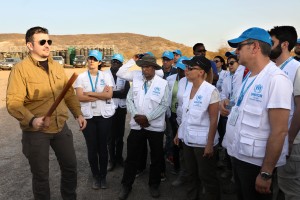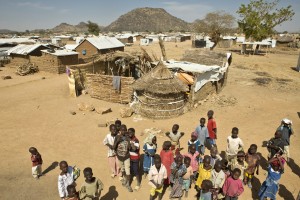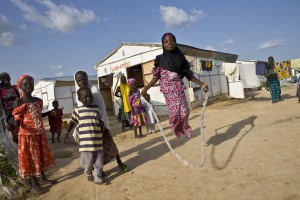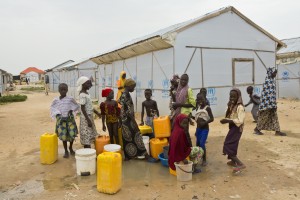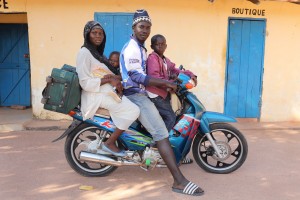UNHCR seeks urgent access to thousands fleeing violence in Bangui
Fighting between rival militias has left more than 36 people dead
BANGUI, CENTRAL AFRICAN REPUBLIC, 29 September 2015 (UNHCR) – Fighting between rival militias in the Central African Republic capital of Bangui since Saturday has left at least 36 people dead, forced thousands to flee their homes and moved the reconciliation process a step backwards.
UN troops have been deployed to restore order however as of this morning UNHCR staff in Bangui say the situation is very tense with shooting in the city centre. The situation is worryingly reminiscent of late 2013 and 2014, when thousands were killed and tens of thousands forcibly displaced by inter-communal conflict. With numerous reports of rival armed groups gathering in the provinces and Bangui we fear the situation could escalate. UNHCR joins others in appealing for calm.
Fighting and the numerous roadblocks have made an already difficult humanitarian situation worse, impeding the ability of UNHCR and partners to gain access to thousands of internally displaced people and assess needs. All sides should urgently allow humanitarian organizations access to areas hosting the newly displaced.
UNHCR, with the help of the International Organization for Migration and other partners, estimates that at least 27,400 people have been displaced, including 10,000 who are sheltering at the Mpoko site near the airport, which was already hosting about 11,000 people. There are immediate needs for emergency shelter, health care and basic aid. If the situation remains volatile, there will be a need for food supplies and hygiene and sanitation facilities. Displaced people are reported to be in a state of shock and extreme fear. Many have been displaced repeatedly.
Bangui had been relatively peaceful for months but renewed fighting began last Saturday after the killing of a young Muslim moto-taxi driver. The violence has caused panic in the capital, where a curfew has been imposed. Elections in CAR are scheduled for October 18. In addition to the deaths, hundreds of civilians have been injured and need treatment, but medical teams have difficulty reaching them, according to Médecins Sans Frontières.
Several international organizations have had their compounds looted. On Monday night, gunmen entered the house of a UNHCR staff member, stealing belongings. Also yesterday evening, hundreds of detainees escaped from Bangui’s Ngaragba Prison, with many reported to have joined the anti-Balaka militia group, which has been fighting the former Seleka militia.
The violence is a reminder of how fragile and unpredictable the security situation in CAR remains, with armed elements still present in some neighbourhoods of Bangui, and in control of several towns and localities in the centre and north of the country (including Bambari, Batangafo, Kaga-Bandoro, Mbres, Kabo).
UNHCR joins the interim UN humanitarian coordinator, MINUSCA and others in calling on all sides for an end to the fighting and to ensure the protection of the civilian population. Social cohesion efforts and dialogue between both communities need to be consolidated as the peace process is clearly still very fragile.
Prior to this latest violence Central African Republic had an internally displaced population estimated at 370,000 people, with 470,000 people having fled into surrounding countries as refugees. The refugee response plan presented by UNHCR and 17 partners to provide protection and assistance to CAR refugees in neighbouring countries has received 23 % of the required US$ 331 million funding, leaving a gap of US$ 254 million.
Media contacts:
In Bangui:
Dalia-Al-Achi, Public Information Officer, alachi@unhcr.org, cell: +236 75 36 26 25; +236 72 67 51 86
Kouassi Lazare Etien, Representative, etien@unhcr.org, cell: 236 72 72 92 92; +236 70 96 47 14
In Geneva:
Leo Dobbs, Senior Communications Officer, dobbs@unhcr.org, +41 79 883 6347
Adrian Edwards, chief of Communications, edwards@unhcr.org, +41 79 557 9120
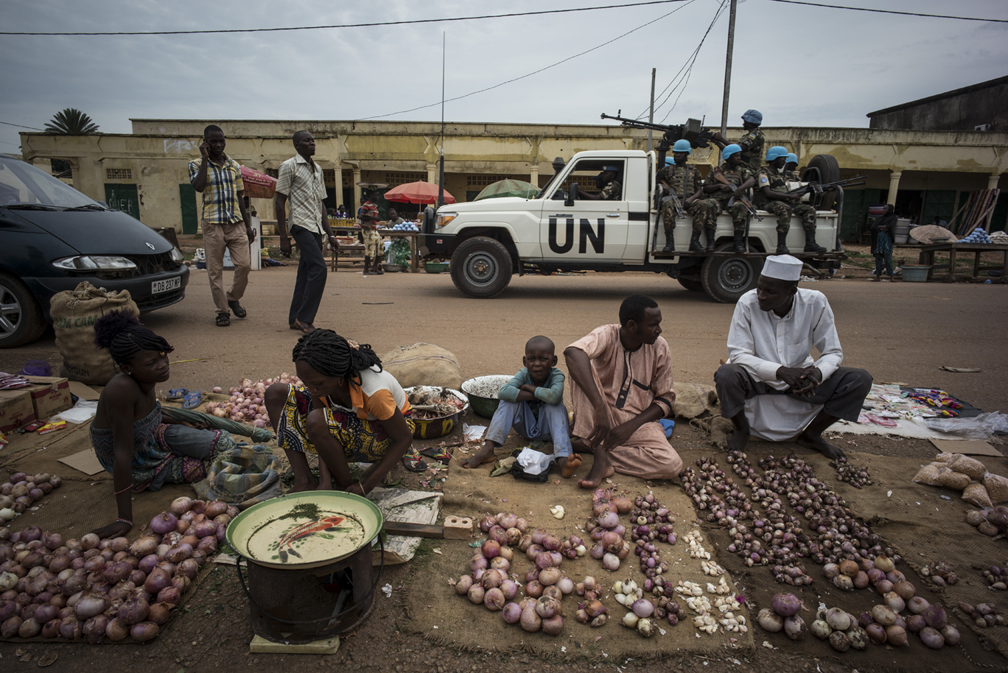
Peace-keeping soldiers from MINUSCA patrol in the PK5 neighbourhood, Bangui. PK5 is the last remaining neighbourhood hosting members of the Muslim community in the Central African capital. The last wave of violence on Saturday forced hundreds of people to flee from that neighbourood as it was the scene of heavy clashes between rival militias. UNHCR / Olivier Laban-Mattei
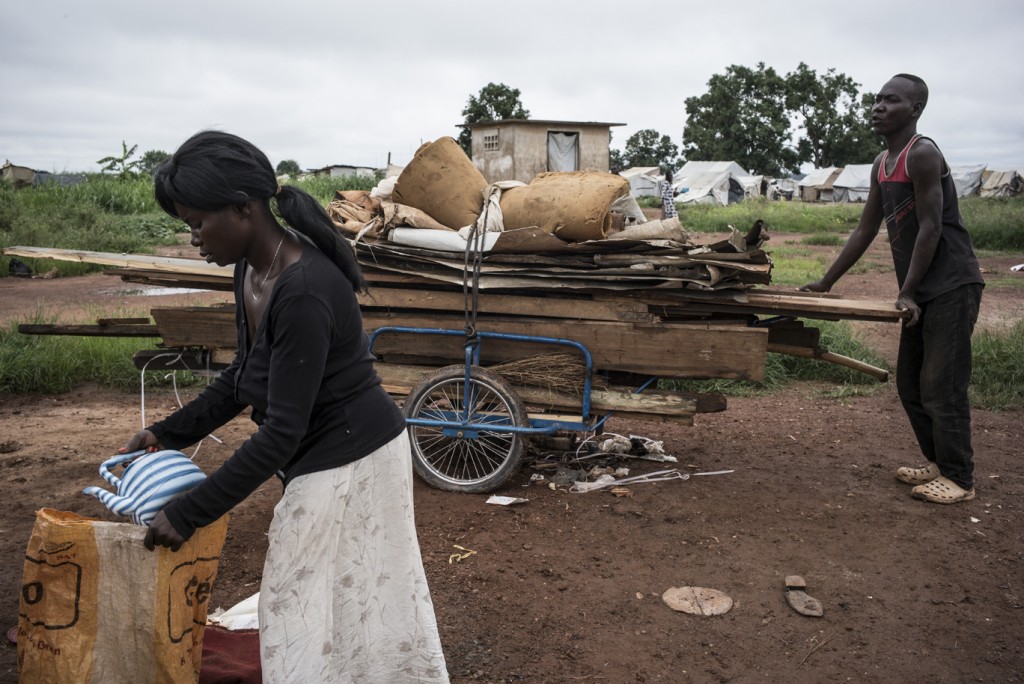 UNHCR / OLIVIER LABAN-MATTEI
UNHCR / OLIVIER LABAN-MATTEILast June, Leslie was packing and preparing her belongings from the Mpoko IDP site to return to her house in the 5th district in Bangui. With the latest violence, people have again fled to find refuge in Mpoko. UNHCR / Olivier Laban-Mattei
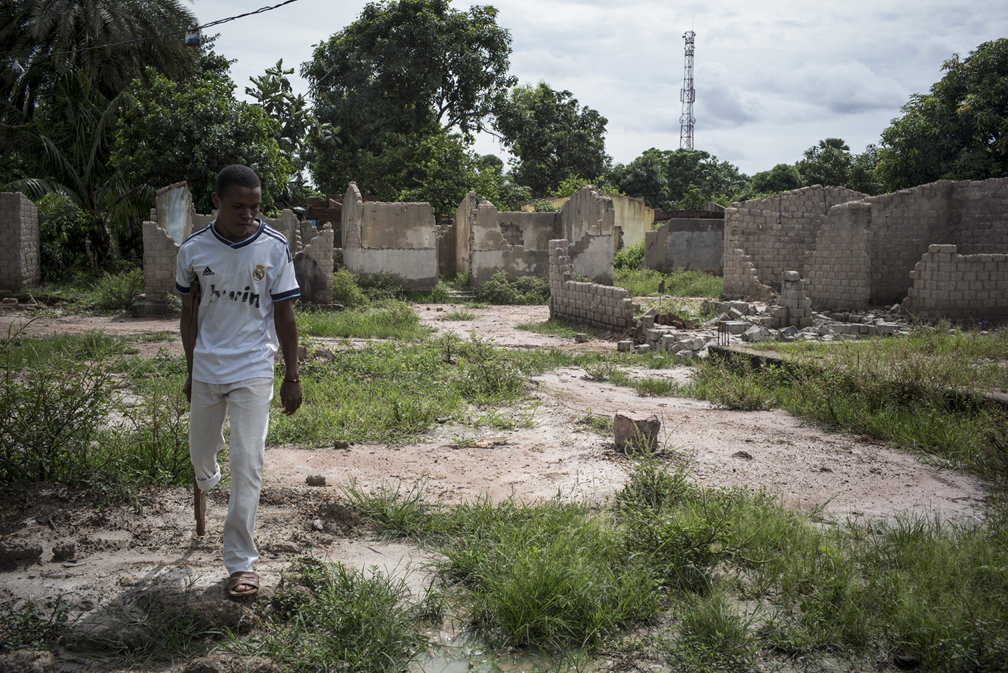
A young man walks in Fondo, one of the neighbourhoods in the PK5 enclave in Bangui, which was severely affected by the fighting in 2013 and 2014. Following the recent improvement of the security situation in 2015, people has started to go back to their homes. With the violence that erupted on Saturday, PK5 became deserted again, with people fleeing in the bush or to IDP camps. UNHCR/Olivier Laban-Mattei
Le texte en français:
Le HCR cherche à avoir accès aux milliers de personnes qui fuient les violences à Bangui
Les dernières violences entre milices rivales qui ont éclaté ce weekend dans la capitale centrafricaine à Bangui ont fait plus de 36 morts, forcé des milliers de personnes à s’enfuir et renvoyé le processus de réconciliation un pas en arrière.
Les troupes des Nations Unies ont été déployées afin de restaurer l’ordre mais depuis très tôt ce matin (Mardi) , les employés du HCR rapporte que la situation reste très tendue dans la capitale, avec des coups de feu qui continuent à crépiter dans le centre-ville. Ces derniers incidents renvoient la Centrafrique aux heures les plus noires de la crise en 2013 et 2014, lorsque des milliers de personnes avaient été tuées, et des dizaines de milliers déplacées par les violences intercommunautaires. Avec les divers rapports sur le regroupement des éléments armés en province et à Bangui, nous craignons que la situation puisse dégénérer. Le HCR se joint aux autres en appelant au calme.
Les combats et les barricades affectent la capacité du HCR et de ses partenaires à avoir accès aux plus vulnérables parmi les personnes déplacées afin de déterminer leur lieu de déplacement, leur nombre et leurs besoins. Toutes les parties devraient incessamment permettre aux organisations humanitaires d'accéder aux zones accueillant des personnes nouvellement déplacées.
Selon les estimations du HCR, en étroite collaboration avec l’Organisation internationale des Migratoins (OIM) et d’autres partenaires, ce sont au moins 27 400 personnes qui ont été déplacées par les dernières violences à Bangui, dont plus de 10 000 qui se sont réfugiées sur le site de Mpoko, près de l’aéroport. Avant les incidents, le site de Mpoko abritait près de 11 000 personnes déplacées internes.
Selon les derniers rapports qui nous parviennent du terrain, il y aurait des besoins urgents en terme d’abris, d’articles de première nécessité et de soins médicaux. Des témoins rapportent que les déplacés sont dans un état de choc et de peur extrême. Beaucoup ont été déplacés à plusieurs reprises.
La situation à Bangui a été relativement calme depuis des mois avec l’approche de la date butoir des élections du 18 octobre prochain, mais les combats ont repris samedi dernier, suite au meurtre d'un jeune conducteur de taxi moto-musulman. La violence, reflétant la fragilité de la situation en RCA, a provoqué la panique dans la capitale, où un couvre-feu a également échoué à mettre fin à la violence.
En plus des morts, des centaines de civils ont été blessés et ont besoin de traitement, mais les équipes médicales peinent à les atteindre, selon Médecins Sans Frontières. Plusieurs bureaux et résidences d’organisations internationales ont été pillés. Lundi soir, des hommes armés se sont infiltrés dans la maison d'un membre du personnel du HCR et ont volé toutes ses affaires. Hier soir toujours (Lundi) , des centaines de détenus se sont évadés de la prison centrale de Ngaragba à Bangui. Une grande majorité d’entre eux aurait rejoint les rangs de la milice anti-Balaka à Boy-Rabe.
Les derniers incidents à Bangui viennent rappeler la volatilité et l’imprévisibilité de la situation sécuritaire en RCA, alors que des éléments armés sont encore présents dans certains quartiers de Bangui, et que plusieurs villes et localités du centre et du nord du pays sont sous contrôle des groupes armés (comme Bambari, Batangafo, Kaga -Bandoro, Mbrés et Kabo).
Le HCR se joint au coordinateur humanitaire des Nations Unies par intérim, à la MINUSCA et d'autres en appelant toutes les parties à mettre fin aux combats et à assurer la protection de la population civile. Les efforts de la cohésion sociale et le dialogue entre les deux communautés doivent être consolidés alors que le processus de paix est clairement encore très fragile.
Avant les dernières violences, la Centrafrique avait une population déplacée interne estimée à 370 000 personnes, ainsi que 470 000 réfugiés centrafricains qui ont fui dans les pays voisins. Le plan d’action régional présenté par le HCR et ses 17 partenaires afin de protéger et assister les réfugiés centrafricains dans les pays voisins a reçu 23 % du financement sur les 331 millions de dollars américains requis, laissant un écart de financement de 254 millions de dollars américains.
